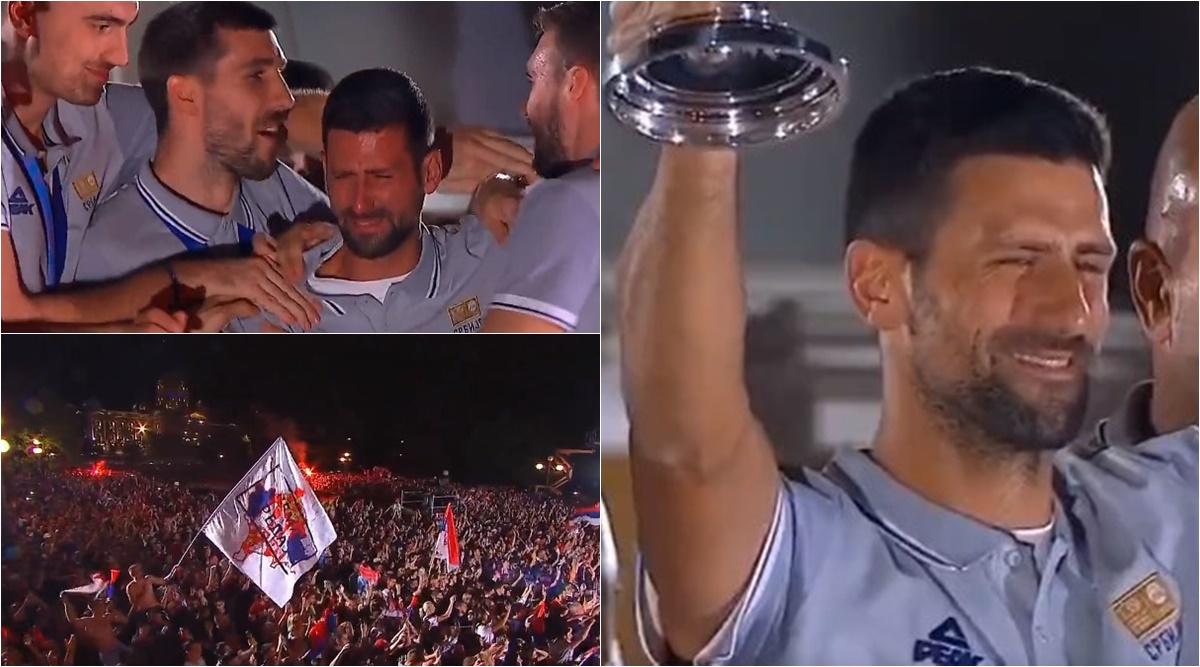It was supposed to be a celebration of the silver medal won by the Serbian national basketball team at the FIBA World Cup, but the occasion was proverbially gatecrashed by a history-maker.
A 24th Grand Slam singles title and fourth US Open in tow, Novak Djokovic arrived in his home country to a raucous reception, thousands waving flags and cheering as the World No.1, who is now the outright record-holder in Open Era Majors, was overawed by the occasion. “This is a childhood dream come true, because once upon a time I was down there and celebrating,” he was quoted as saying by tennismajors.com, holding back tears.

Djokovic has always worn his Serbian heritage on his sleeve, in acknowledgment of all that he has had to overcome to achieve what he has, and in defiance of the kind of stereotypes that are associated with his home country. Stereotypes that, he believes, continue to hold him back in international acknowledgment of his greatness despite his resume suggesting so.
“One thing is a fact, though – if I wasn’t from Serbia, I’d have been glorified on a sporting level many years ago, especially in the West,” he was quoted as saying by tennismajors.com, translating his Serbian post-US Open press conference. “But that’s part of my journey, I am grateful and proud to come from Serbia – because of that, all of these accomplishments are sweeter and even more fulfilling.”
ALSO READ | Emotional Novak Djokovic breaks down in tears during celebration of US Open win with Serbia basketball team
Djokovic’s upbringing in war-torn Serbia is undoubtedly a huge part of his personal experience, and shapes his story as a sporting champion. Having grown up at a time when the economic consequences of the war crippled his family, taking up an individual sport as expensive as tennis was never easy.
“The odds were pretty much against me and my family, but, you know, we did it. I say ‘we,’ because I owe a lot to my family, to my parents who sacrificed so much for me to be here,” he told international media on Sunday.
“It was extremely, extremely difficult with lots of adversities that they had to face and atrocities that when you think about it, the last thing you want to think about is supporting your child in an expensive sport.”
“It was more about bringing the bread to the kitchen table at that point. So reflecting on the whole journey, it’s been an incredible, incredible ride that we all can be very proud of. This kind of upbringing, really, and experiences I had in childhood really allow me to appreciate this moment or any other moments that I experienced, big moments in my career in the history of this sport,” he added.
It is then a sporting oddity that Djokovic’s story is not considered a source of inspiration by most, perhaps due to the peculiarities of tennis. The country club-like atmosphere at tennis tournaments is not exactly a platform for addressing the various complexities that come with Djokovic’s personality – how his upbringing shaped his extreme self-belief and patriotism. Swiss grace and Spanish grit were bases of storytelling that were both easier to tell, and to understand, as opposed to Serbian defiance.
No signs of slowing
But droning on about Djokovic’s past rivalries is, in essence, pointless. Having won 24 Grand Slams, pulling away from Roger Federer, who is now retired, and Rafael Nadal, who is still recovering for injury hoping for a farewell in 2024, he has outrightly established himself as the most successful tennis player ever.
His greatness is not just summed up in one number, but in his longevity at the top (he has reached 36 finals in 72 Grand Slams), and the versatility of his achievements (he has won at least three titles at each of the four Grand Slam tournaments).
And there are no signs of slowing down. The big stage continues to motivate him, as is evident from him reaching the final at all four Grand Slams and winning three of them in the year he turned 36.
Most Read 1Chandrayaan-3 mission: Dawn breaks on Moon, all eyes on lander, rover to wake up 2As Indo-Canadian relations sour, anxiety grips Indian students, residents who wish to settle in Canada 3Karan Johar says Sanjay Leela Bhansali did not call him after Rocky Aur Rani: ‘He’s never called me but…’ 4Gadar 2 box office collection day 40: Hit by Shah Rukh Khan’s Jawan onslaught, Sunny Deol movie ends BO run with Rs 45 lakh earning 5Shubh’s tour in India cancelled: Why is the Canada-based singer facing the music?
“Eventually one day I will leave tennis in about 23, 24 years,” Djokovic jokingly told the English media after the US Open. “And there are going to be new young players coming up. Until then, I guess you’ll see me a bit more.”
His coach, 2001 Wimbledon champion Goran Ivanisevic, was more serious when answering a question of whether Djokovic is close to calling time on his career “You’ll have to ask him (about his future),” he said. “I don’t think so. No, no, he’s planning to play in the Olympic Games in Los Angeles.” Djokovic will be 41 when the quadrennial event is held in the US in 2028.
Also ReadRoger Federer match-worn outfit from 20th major title run expected to fet…Rohan Bopanna ends Davis Cup career with a win as India beat Morocco 4-1Davis Cup: India start tamely as lower-ranked Morocco hold them 1-1 on op…Does Steffi Graf ever age? Husband Andre Agassi has the perfect reply
Conversations about Djokovic being among the greatest athletes in any sport will continue as he goes to Paris next year to try to win an Olympic gold – the only gap in a peerless resume. But with him staying fit as ever, even in the twilight of his career, Serbia should have a lot more to cheer for in the coming years.


